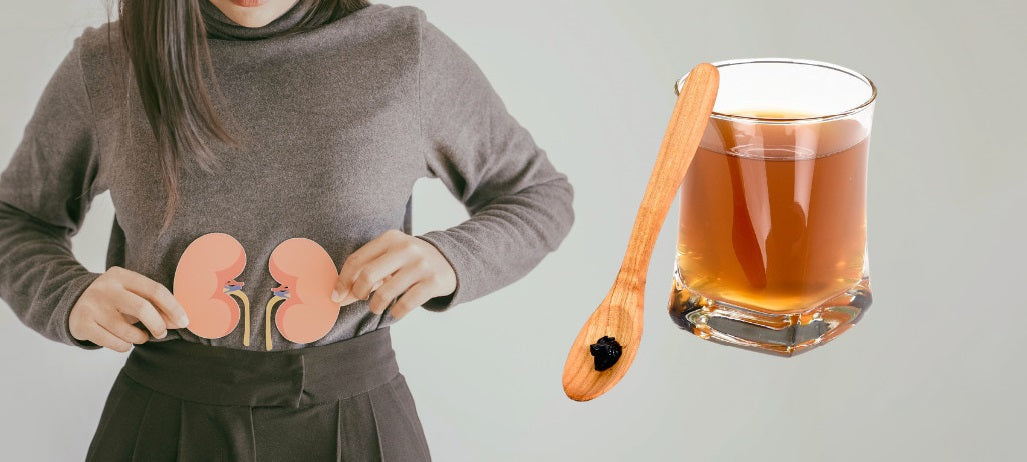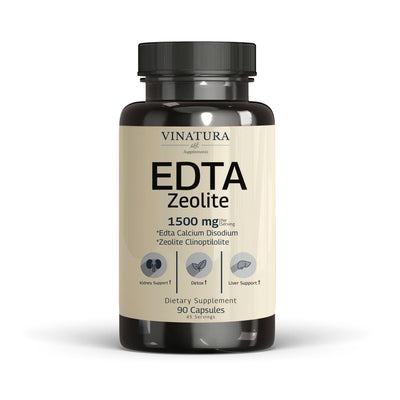
Is Shilajit Bad for Kidneys?
Shilajit contains antioxidants, providing improved libido, increased energy, reduced fatigue, and overall health enhancement. However, concerns have been raised about potential kidney harm from Shilajit's use. Is this true?
Is shilajit bad for kidneys? And does Shilajit help kidney patients improve or worsen their condition? Let's find out in this article to gain valuable insights.
Before exploring further, please read the disclaimer located at the end of this webpage.
Is Shilajit Bad for Kidneys?

Shilajit appears to have no harmful effects on the kidneys, as suggested in some online opinions. The truth is that there are very few studies that claim this issue.
This could be because some low-quality products have affected the health of kidney patients, especially Shilajit products contaminated with heavy metals, unintentionally creating conflicting opinions about Shilajit's impact on the kidneys.
On the contrary, Shilajit offers many potential benefits and may help enhance kidney health by maintaining optimal kidney function and regularity. This aids in naturally eliminating toxins accumulated within the digestive tract. As a result, it supports the overall health of the urinary system.
Shlajit also exhibits anti-diabetic properties, including blood sugar regulation, anti-obesity, antioxidant, anti-inflammatory, and metabolic enhancement.
Another discovered benefit is its ability to promote fat burning, thus reducing obesity and insulin resistance. This would benefit those looking to use Shilajit for weight loss and maintaining stable blood sugar levels. [1]
However, kidney patients must be cautious when using Shilajit, and more extensive research is needed to verify its safety.
Related Article: How to Identify Shilajit Real or Fake? Testing Pure Shilajit
What Science Says About Shilajit and Kidneys?

Study investigating the impact of shilajit on the liver and kidneys in spinal cord injured mice. In the study, mice were treated with shilajit at doses of 150 mg/kg and 250 mg/kg for three days.
The results showed that the use of shilajit may reduce the formation of damage in the liver and kidneys following spinal cord injury, possibly due to its anti-inflammatory properties. [2]
Another study has also addressed the effects of Shilajit in treating kidney stones and preventing edema. The components in Shilajit may help dissolve stones and enhance the process of eliminating deposits from the kidneys.
Furthermore, it may also reduce edema, a common condition when the kidneys are not functioning effectively, leading to fluid accumulation in the body. [3]
Therefore, it can be observed that Shilajit has positive effects on the kidneys.
Using Shilajit can help you take better care of your body.
What Are the Potential Impacts of Shilajit on Kidneys?
Anti-Inflammatory And Antioxidant Properties of Shilajit
Shilajit contains humus, organic plant material, and active compounds such as dibenzo-alpha-pyrones and fulvic acid. Thanks to these substances, it possesses antioxidant and anti-inflammatory properties.
Shilajit can help reduce inflammation and protect cells from damage caused by free radicals and other harmful agents. As a result, it can enhance physical performance and reduce fatigue during exercise. [4]
In cancer treatment, there is a chemotherapy drug called Cisplatin. However, its use can cause damage to the kidneys. Therefore, if you use Shilajit, known for its antioxidant and anti-inflammatory properties, it may help minimize kidney damage caused by Cisplatin. [5]
Shilajit Is a Rich Source of Minerals And Trace Elements
Shilajit contains various minerals, including As, Pb, Cd, Ag, Al, B, Ba, Cr, Cu, Fe, Mn, Ni, Sb, Se, Zn, P, Ca, K, Mg, and Na. These minerals contribute to Shilajit's positive effects in healing and providing nutrition to the human body. [6]
These minerals in the body can support the natural detoxification process of the kidneys by assisting in removing toxins and waste products. [7]
Furthermore, Shilajit is rich in fulvic acid, which aids in mineral absorption and overall health support [6]. It can be understood that Shilajit may promote overall kidney health.
Trace elements are essential minerals for the body but are required only in tiny amounts. In Shilajit, trace elements constitute about 5 [6].
Trace elements such as calcium and magnesium can help prevent the accumulation of certain minerals in the kidneys, reducing the risk of kidney stone formation.
Trace elements play a vital role in various biological processes in the body, helping to maintain overall health and support the function of organs, including the kidneys. [7]
Several Amazon users who have taken supplements containing Shilajit have reported noticeable changes in their bodies. One user, Matt D., mentioned that after using the supplement for a few weeks, he felt he had a bit more focus and energy throughout the day.*
Side Effects and Interaction May Happen When Kidney Patients Take Shilajit

Although Shilajit may positively affect the kidneys, caution is advised when using it. Shilajit may contain high levels of heavy metals, which can be harmful to those with kidney issues as their bodies may struggle to filter these substances properly.
Individuals with kidney disease are impaired in their ability to excrete potassium normally. When they consume excess salt containing potassium, absorbing a large amount of potassium from this salt can lead to potassium accumulation in the blood.
This can result in high blood potassium levels, known as hyperkalemia, which can cause serious health problems [8]. Since Shilajit typically contains high levels of potassium, calcium, and magnesium, often comprising more than 90% [9], it may have adverse effects.
This can also occur with other substances like sodium [10] and phosphorus [11].
The body may not be able to excrete these substances properly.
Consuming substances like sodium and phosphorus can lead to their accumulation in the blood, causing health issues, including elevated blood potassium levels.
Moreover, Shilajit may interact with some commonly prescribed medications for kidney conditions. Suppose you use Shilajit without the approval of experts. In that case, it may affect the effectiveness of drugs or cause adverse reactions in the body.
Furthermore, Shilajit is not recognized by the FDA, signaling that you must carefully seek authentic and high-quality Shilajit products from reputable and trusted sources of Shilajit to ensure safety when using it.
How Do Kidney Patients Use Shilajit Safely?
Patients with kidney conditions should use Shilajit cautiously and under the guidance of healthcare professionals to ensure safety. Below are some considerations to keep in mind before using Shilajit:
- Consult with a doctor and healthcare experts.
- Seek a reputable source of Shilajit. You can ask for recommendations from others and look for certifications from the provider to verify the product's safety.
- Start with a low dosage and gradually increase if well tolerated and yield positive results.
- Monitor kidney function regularly for timely interventions.
- Stay hydrated, as this can support kidney function and eliminate toxins from the body.
- If you intend to use Shilajit along with other substances, research and follow the guidance of healthcare professionals.
Learn more: Types Of Shilajit: Shilajit Powder Vs Resin Or Capsules?
Frequently Asked Questions
1. What Are the Risks of Taking Shilajit?
Shilajit is generally safe when taken as directed, but it may cause sore throat, headache, dizziness, nausea, diarrhea, or hormonal imbalance (increased testosterone leading to acne, hair loss, or irregular periods) [11].
2. Is Shilajit Good for Your Kidneys?
Shilajit may be beneficial for kidney health thanks to its protective and anti-inflammatory properties. Research suggests it can help reduce inflammation and improve metabolic balance, which supports kidney function [12].
In animal studies, shilajit demonstrated protective effects on both the liver and kidneys, indicating potential benefits for maintaining healthy renal function. However, more human research is needed to confirm its safety and efficacy [12].
3. Who Cannot Drink Shilajit?
People who should not take Shilajit include pregnant or breastfeeding women and individuals with heart disease, blood pressure problems, diabetes, liver or kidney disorders, immune system conditions, or iron overload (hemochromatosis) [11].
In rare cases, Shilajit may cause high blood pressure, low potassium, or metabolic alkalosis. Stop using it immediately if any side effects appear and consult a doctor [11].
Conclusion
Shilajit positively affects our kidneys due to its anti-inflammatory and antioxidant properties and richness in minerals and trace elements.
However, patients with kidney conditions should consult healthcare providers before incorporating it into their treatment regimen. Because Shilajit may interact with other medications, this could adversely affect your body.
References
- [1] SANCAK, T., OKULMUŞ, Ç., AKYOL, Mehmet Edip, KELEŞ, Ömer Faruk, & ÇETİN, E. (2023). Histopathological and Biochemical Investigation of the Effect of Shilajit on Liver and Kidney in Rats with Experimental Spinal Cord Injury. | Firat Universitesi Saglik Bilimleri Veteriner Dergisi | EBSCOhost. Ebsco.com, 37(3), 230. https://doi.org/%22
- [2] Agarwal, S. P., Khanna, R., Ritesh Karmarkar, Md. Khalid Anwer, & Khar, R. K. (2007). Shilajit: a review. PTR. Phytotherapy Research/Phytotherapy Research, 21(5), 401–405. https://doi.org/10.1002/ptr.2100
- [3] Bhavsar, S. K., Thaker, A. M., & Malik, J. K. (2016, January 1). Chapter 51 - Shilajit (R. C. Gupta, Ed.). ScienceDirect; Academic Press. https://www.sciencedirect.com/science/article/abs/pii/B9780128021477000516
- [4] Sunil Babanrao Pandit, Hemant Jibhau Pagar, Tejal Raman Patel, & Sarika Anand Jadhav. (2018, September). In vivo study of Nephroprotective potential of Shilajit by using Cisplatin induced nephrotoxicity model. ResearchGate; unknown. https://www.researchgate.net/publication/327640473_In_vivo_study_of_Nephroprotective_potential_of_Shilajit_by_using_Cisplatin_induced_nephrotoxicity_model
- [5] Fadheela Al-Salman, Ali Ali Redha, & Zahraa Al-Zaimoor. (2020, June 30). Inorganic Analysis and Antioxidant Activity of Shilajit. ResearchGate; unknown. https://www.researchgate.net/publication/342921985_Inorganic_Analysis_and_Antioxidant_Activity_of_Shilajit
- [6] Trace minerals and the kidney: an overview. (2024). Journal of the American College of Nutrition. https://www.tandfonline.com/doi/abs/10.1080/07315724.1989.10720303
- [7] Doorenbos, C. J., & Vermeij, C. G. (2003). Lesson of the week: Danger of salt substitutes that contain potassium in patients with renal failure. BMJ. British Medical Journal, 326(7379), 35–36. https://doi.org/10.1136/bmj.326.7379.35
- [8] Stohs, S. J. (2013). Safety and Efficacy of Shilajit (Mumie, Moomiyo). PTR. Phytotherapy Research/Phytotherapy Research, 28(4), 475–479. https://doi.org/10.1002/ptr.5018
- [9] Borrelli, S., Provenzano, M., Gagliardi, I., Michael, A., Maria Elena Liberti, Luca De Nicola, Conte, G., Garofalo, C., & Andreucci, M. (2020). Sodium Intake and Chronic Kidney Disease. International Journal of Molecular Sciences, 21(13), 4744–4744. https://doi.org/10.3390/ijms21134744
- [10] Nadkarni, G. N., & Uribarri, J. (2014). Phosphorus and the Kidney: What Is Known and What Is Needed. Advances in Nutrition, 5(1), 98–103. https://doi.org/10.3945/an.113.004655
- [11] Clinic, C. (2025, March 11). A Quick Introduction to Shilajit. Cleveland Clinic. https://health.clevelandclinic.org/shilajit-benefits
- [12] Jambi, E. J., & Abdulaziz Alshubaily, F. (2022). Shilajit potentiates the effect of chemotherapeutic drugs and mitigates metastasis induced liver and kidney damages in osteosarcoma rats. Saudi Journal of Biological Sciences, 29(9), 103393. https://doi.org/10.1016/j.sjbs.2022.103393
Testimonial Disclaimer
*The testimonials presented on this website are provided by individuals based on their personal experiences with our products. These testimonials represent individual opinions and experiences, which may not be typical or applicable to all users of our products. Results may vary depending on a variety of factors, including individual health, lifestyle, and adherence to product usage instructions.Author

Product Disclaimer
Including an ingredient or study does not evaluate, endorse, or recommend any Vinatura product or any third-party product. Some ingredients discussed may not be used in any Vinatura product.
The content of the articles has not been evaluated by the Food and Drug Administration (FDA) and is not intended to promote or endorse any specific product. Any products sold on this website are not intended to diagnose, treat, cure, or prevent any disease.
Opinions and Endorsements
Any claims, statements, or opinions expressed in the articles are those of the author(s) and do not necessarily reflect the views or opinions of the manufacturers of the dietary supplement products. The products sold on this website are separate from the content of the articles and are not directly endorsed or associated with the information presented here.
Liability Disclaimer
The author(s) of the articles, website, and manufacturers of the dietary supplement products do not assume any liability for any potential consequences arising from the use of the information provided in the articles. Ingredient effects, dosages, and safety vary by individual, formulation, and context; some ingredients interact with medications or may be unsuitable during pregnancy or lactation. It is recommended that individuals consult with a qualified healthcare professional before making any dietary or lifestyle changes, including the use of dietary supplements.
Product Usage
Please refer to the product labels and packaging for specific usage instructions and guidelines for the dietary supplement products sold on this website.
Customer Support
For any concerns or questions regarding the dietary supplement products, please contact our customer support team, who will be more than happy to assist you.






Leave a Comment
Be the first to comment.
What do you think?